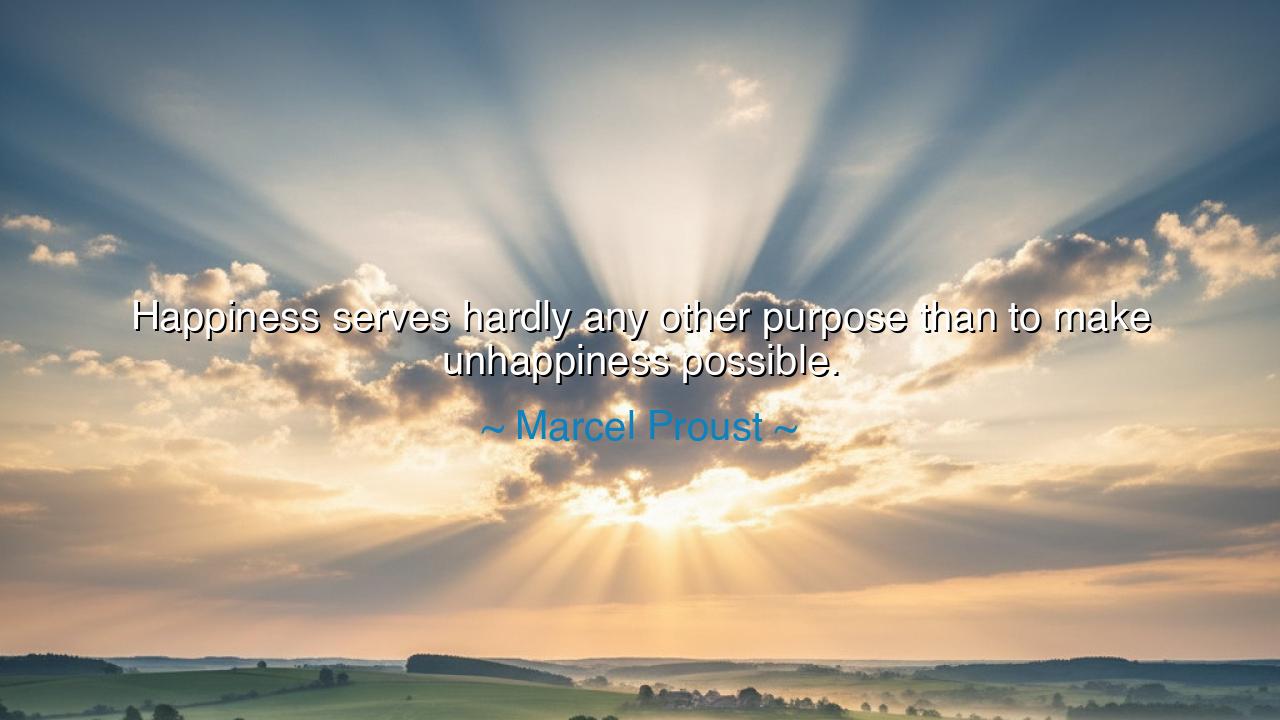
Happiness serves hardly any other purpose than to make






“Happiness serves hardly any other purpose than to make unhappiness possible.”
Thus wrote Marcel Proust, the chronicler of memory and emotion, whose gaze saw deeper into the human heart than most dare to look. In this paradoxical and haunting line, Proust reveals the fragile balance upon which the soul rests—the strange truth that happiness and unhappiness are not enemies, but companions born of the same root. Without joy, sorrow could not exist; without light, darkness would be meaningless. What he teaches is not despair, but understanding: that our capacity to suffer springs from our capacity to feel, and that the same door through which happiness enters the heart remains open for pain.
The origin of these words lies in Proust’s monumental work, In Search of Lost Time, a vast meditation on love, memory, and the passage of life. Proust was a man who lived between moments of ecstatic joy and suffocating sorrow. He spent his days confined to his room, ill and isolated, yet through his suffering, he uncovered the hidden architecture of human emotion. To him, happiness was fleeting, like the scent of a flower carried on a breeze—beautiful, ephemeral, and always vanishing. But he also understood that its disappearance left behind a powerful echo, the awareness of loss, from which the deepest truths of existence are born.
To say that happiness “serves to make unhappiness possible” is to say that joy is the spark that reveals the shadows within us. When we love, we expose ourselves to grief; when we rejoice, we invite the possibility of mourning. A person who has never known happiness cannot truly know sorrow, for sorrow is but the shadow cast by joy. The ancients, too, knew this law of balance. Heraclitus, the philosopher of fire, declared that all things are born of opposition—day and night, life and death, peace and struggle. To feel happiness, then, is to awaken the soul to its own fragility. It is to drink from a cup that one day must empty, and to know—consciously or not—that its sweetness cannot last forever.
Consider the story of Helen Keller, born into silence and darkness. When she first learned to communicate through the touch of her teacher’s hand, she felt a joy she had never known. Yet that joy, too, carried with it an awareness of what she had been missing, of the long years of isolation behind her. In her later writings, she spoke not only of happiness but of sorrow’s dignity—how understanding loss deepened her love for the smallest blessings. Her happiness made her unhappiness possible, but her unhappiness, in turn, made her happiness profound. Thus the two were not opposites, but mirrors reflecting the fullness of her humanity.
Proust’s insight also carries a quieter wisdom: that we often fail to appreciate happiness while it lives. When joy visits us, we rarely recognize its value until it departs. Only in hindsight do we realize that those ordinary days—the laughter shared, the sunlight falling across a familiar room—were moments of great beauty. In this sense, unhappiness is the teacher of happiness. It sharpens our vision, humbles our hearts, and reveals the sacredness of what we once took for granted. It is by contrast that we learn to see clearly; by absence, that we learn to cherish presence.
Let this truth, then, be a comfort, not a burden. If happiness and unhappiness are intertwined, then sorrow need not be feared. It is the proof that we have loved, that we have lived fully, that our hearts were open enough to be touched by both joy and pain. The wise do not curse unhappiness—they honor it as the echo of joy. They know that to feel deeply, even in suffering, is a privilege denied to the indifferent. The heart that has known happiness and sorrow alike is a heart that has lived richly, for it has tasted both heaven and earth.
So, my child, when you find yourself in moments of sorrow, remember Proust’s words and do not despair. The pain you feel is the shadow of the joy you once knew, and it foretells that joy will come again. Do not close your heart to avoid suffering, for in doing so, you will also close it to delight. Instead, welcome both happiness and unhappiness as sacred travelers, each with their own wisdom to give. Cherish happiness when it comes, but when it departs, thank it for the depth it has left behind. For in the end, as Proust teaches, it is not unbroken bliss that makes life beautiful—but the fragile, fleeting, and fully felt balance between joy and sorrow that gives life its divine meaning.






AAdministratorAdministrator
Welcome, honored guests. Please leave a comment, we will respond soon